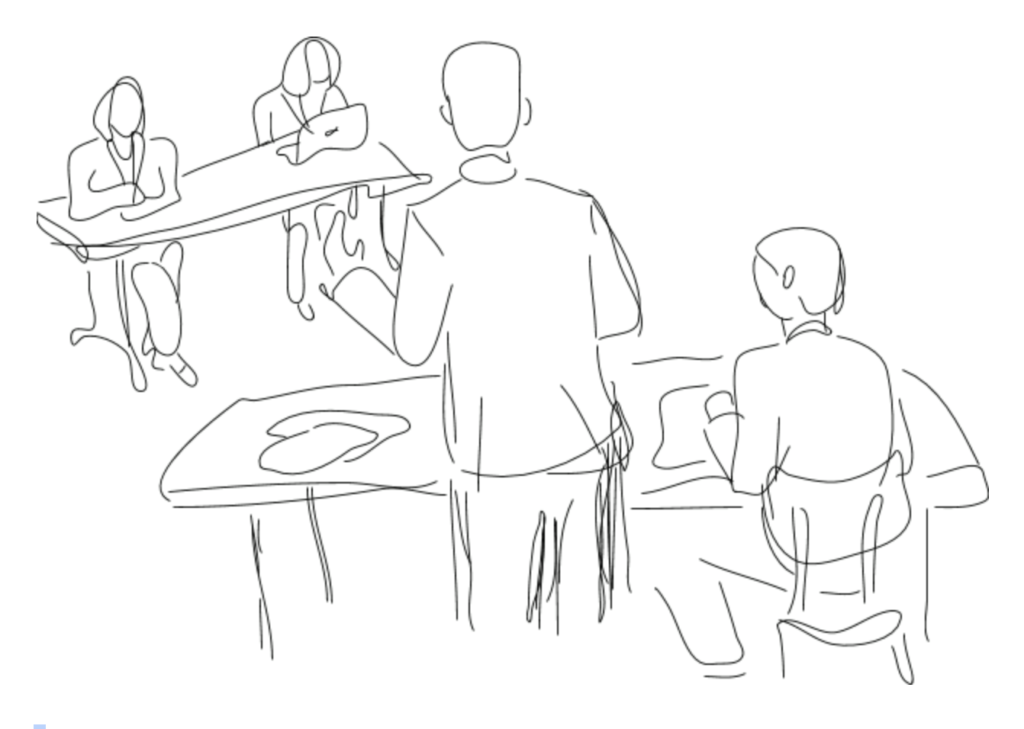Historic unionization hearing concludes, with NLRB ruling pending
Scarlet & Black 2018-10-18
By Zoe Fruchter and Chloe Wray fruchter@grinnell.edu wraychlo@grinnell.edu Today concluded the National Labor Relations Board (NLRB) hearing as to whether the Union of Grinnell Student Dining Workers (UGSDW) could hold an election to expand their membership to all student workers. The hearing began on Wednesday, Oct. 17.
Thursday’s hearing consisted of testimony given by witnesses called by the Union, the petitioner, as well as closing arguments from both the Union the employer, Grinnell College. The College’s stance is opposition to an election and union expansion.
UGSDW called Professor Kesho Scott, sociology and American studies, to testify on how socioeconomic status plays in the lives of Grinnell College students, as based on her experience advising and interacting with low-income students.
In his cross examination of Scott, Frank Harty, an attorney for the College, asked if she believed implicit bias regarding socioeconomic or racial groups, was “real.” Professor Scott responded in the affirmative.
UGSDW called three students to testify about the economic necessity of their employment at the College. First, Quinn Ercolani ’20, current UGSDW president and SGA treasurer, spoke on how his work is essential to his continuing attendance at the College.
Similarly, Caitlin Richter ’19 testified on her work in various Dining Hall positions, working eight to 10 hours a week to afford her tuition. Richter said she works in the Dining Hall despite forgoing other employment opportunities suited for her academic interests because Dining Hall provided more flexibility with scheduling.
The Union’s fourth witness of the day, Peter Cipriano ’19, spoke about taking a year off from Grinnell due to his inability to afford tuition, room and board. Cipriano, now a lifeguard at the College, worked two jobs to support himself and his family during his leave of absence.
The Union’s final witness was Allyson Leicht ’19. Leicht works multiple on-campus jobs while receiving financial aid and said she depends “pretty much primarily on campus employment” for food, housing and clothing.
After the students’ testimonies, the College introduced a revision of their Statement of Position. Initially, the College’s statement said that collective bargaining would limit resources, resulting in students only getting to work jobs based on need. The original statement reads, “This would result in a ‘caste’ system or the creation of an underclass of serfs performing campus employment opportunities while their wealthy classmates simply concentrated on their studies.” While the statement was rephrased to exclude “caste system” and “serfs,” the original Statement of Position will remain on file.
Following introduction and admittance of the document, UGSDW and the College delivered their final statements.
Cory McCartan, UGSDW advisor and founder, said that student workers are statutory employees of the College and thus have the right to collective bargaining. McCartan argued against the College’s stance that students’ jobs are educational and thus not deserving of unionization status, saying that a job being instructive has no connection to the economic condition of the students or their need for collective bargaining.
McCartan invoked the NLRB’s 2016 decision The Trustees of Columbia University in the City of New York and Graduate Workers of Columbia as precedent, noting that the NLRB decided that student workers were eligible for collective bargaining in this case.
Finally, McCartan addressed the College’s allusions to wealth stratification throughout the hearing: “If the employer is concerned about inequity between wealthy and low-income students, they should take a look at their current system in which many low-income students have to work much more than their peers.”
Harty claimed that the petitioner’s witnesses proved the College’s point. Harty expressed that witnesses corroborated Grinnell College President Raynard Kington’s testimony that campus jobs were primarily educational, and that students attend the College for higher education, not working, thus they are not employees subject to NLRB review.
Harty went on to state that the fear of stratification was real, and that if collective bargaining were granted, work opportunities would be limited to those with the most need. He concluded that unionizing would violate FERPA and FAFSA, jeopardizing student’s rights to financial privacy. Harty denied comment to The S&B.
The hearing closed at 1:36 p.m.
Lisa Lacher, senior content strategist for media relations, in the College’s Office of Communications, wrote in an email to The S&B, “because there is a pending matter before the National Labor Relations Board, we [the College] think it prudent not to comment.”
Following the hearing, the NLRB will notify both parties if they can administer an election to expand the union. Should the NLRB rule in favor of UGSDW’s petition, the election will take place in Joe Rosenfield Center (JRC) 101 on Friday Nov. 9, from 9 a.m. to 5 p.m. Any undergraduate employee of the College who logged hours between Sept. 16, 2018 and Oct. 15, 2018 will be able to vote.

UGSDW advisor and founder Cory McCartan ’19 delivers his closing statement to Judge Martha Freeburg on Oct. 18, 2018. Art by Zoe Fruchter ’21.